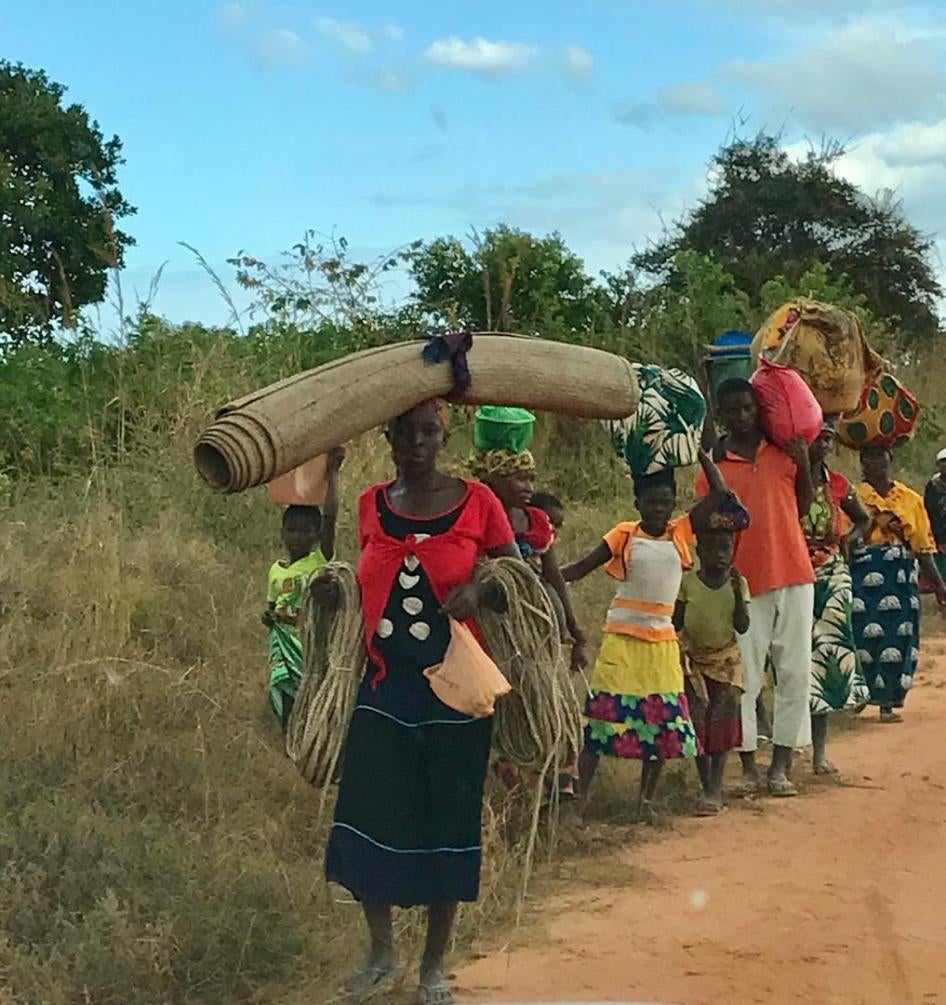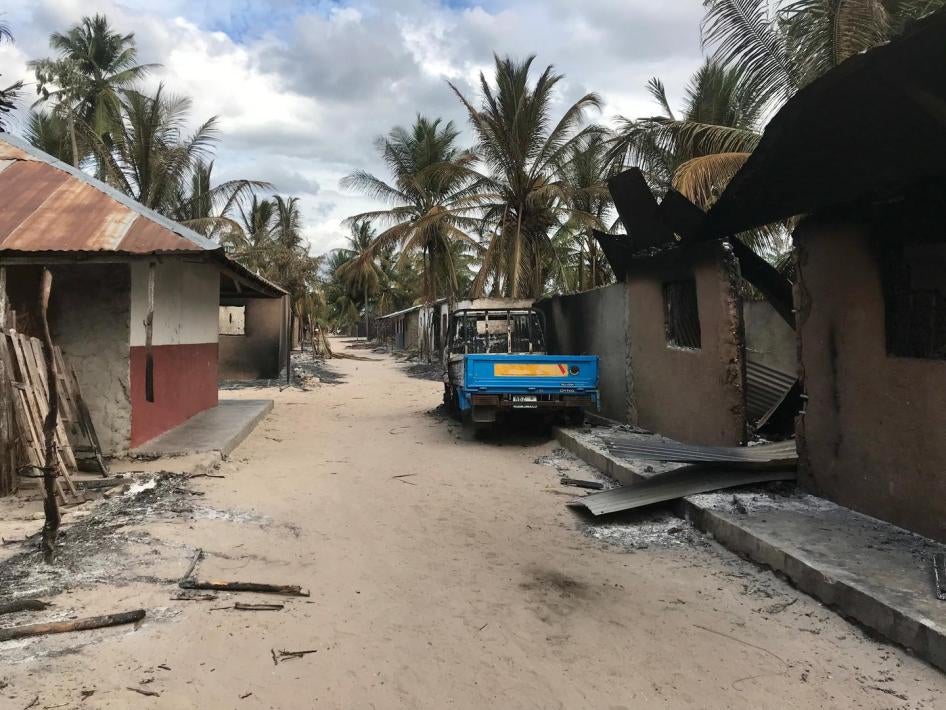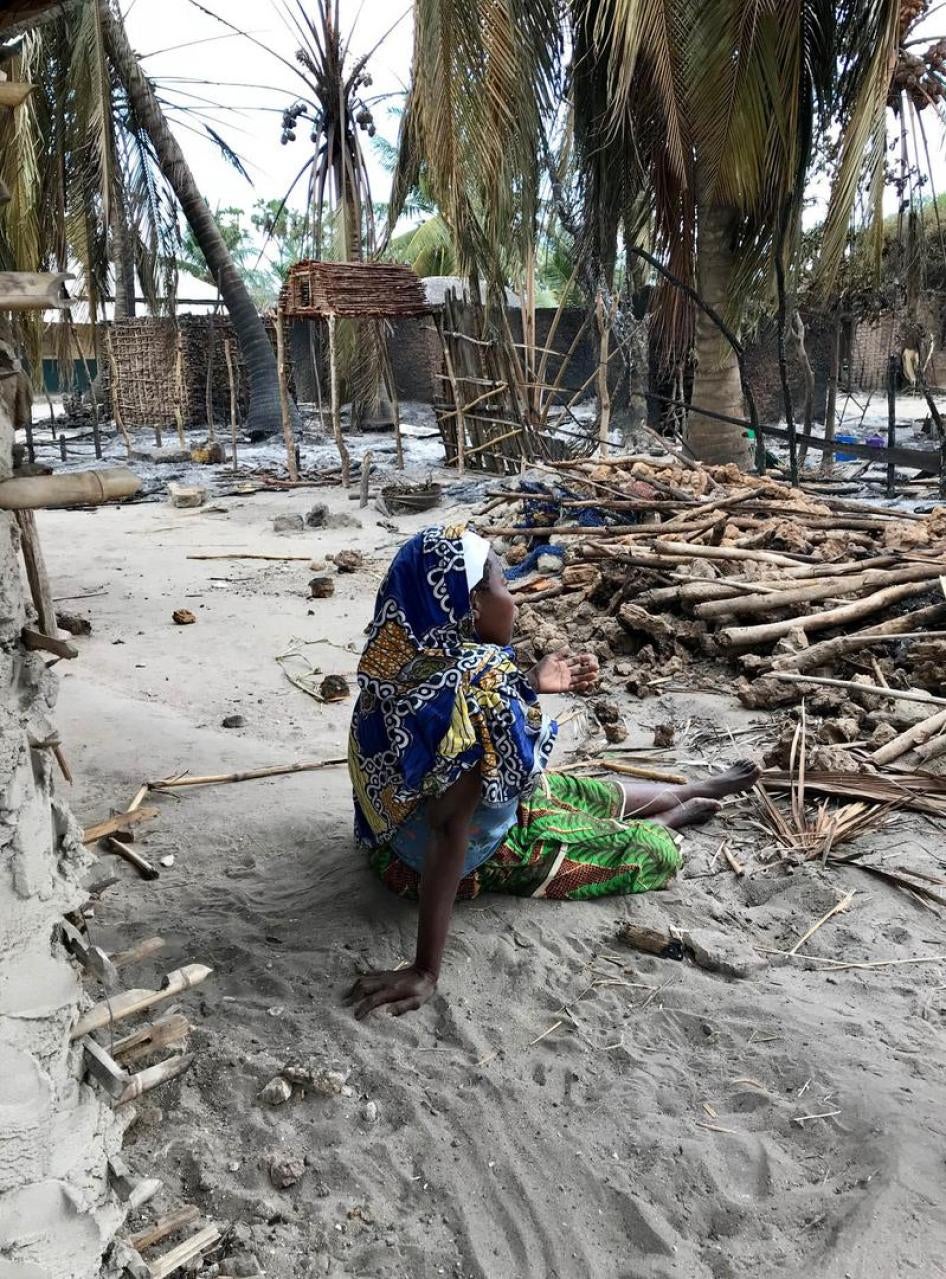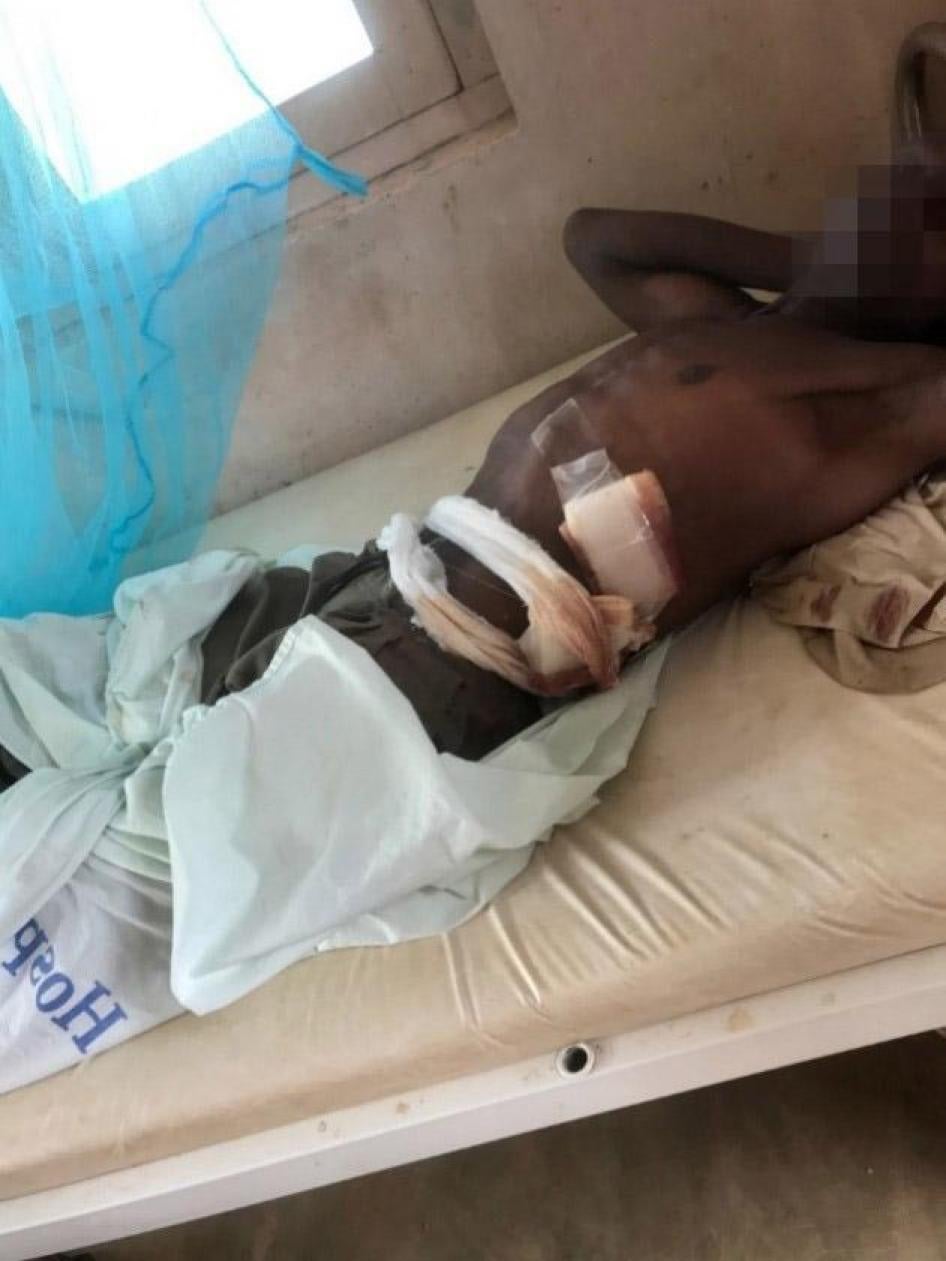(Johannesburg) – Attacks by armed groups in Mozambique’s northern province of Cabo Delgado have killed at least 39 people and displaced more than 1,000 since May 2018. Hundreds of families fled their villages after suspected members of an armed Islamist group burned down their houses during nighttime attacks.
The group implicated in the attacks is known locally as both Al-Sunna wa Jama’a and Al-Shabab, though it has no publicly known connection with the Somali group of the same name. Local activists told Human Rights Watch that more than 400 homes have been burned down in the past two weeks, displacing people in three districts. Mozambican authorities should investigate and provide assistance to those in need.
“Armed groups should immediately cease attacking villages and executing people,” said Dewa Mavhinga, Southern Africa director at Human Rights Watch. “Mozambican authorities should assist those displaced and establish conditions that will allow them to return home voluntarily, in safety and with dignity.”
Human Rights Watch researchers visited the village of Naunde, in Mucojo town, Macomia district after an attack on June 5, and saw 164 houses, five cars, and scores of cattle burned. The residents said the attackers had burned a local mosque, including copies of the Quran and prayer mats, and beheaded a local Islamic leader inside the mosque. Human Rights Watch witnessed dozens of families carrying their belongings and fleeing the village.
Human Rights Watch also spoke by phone with residents of villages that were attacked on June 6 and June 12, the most recent attack. Various sources in Macomia and Quissanga districts confirmed that hundreds of people were still fleeing their villages for fear of more attacks.
One villager in Naunde said that the attackers caught a community leader: “When he realized they were looking for him, he tried to run away but one of the men chased him, grabbed him by the arm, held the machete, and cut his head off… there in front of everybody.”
The wave of violence in Cabo Delgado province began in October 2017, when suspected armed Islamists attacked a string of police stations in the Mocimboa da Praia district, causing two days of lockdown in the area and a massive military response that led to the evacuation of villages. Following the attack, authorities closed seven mosques and detained more than 300 people without charge, including religious leaders and foreigners suspected of having links to the armed attacks in Palma and Mocimboa da Praia districts, which are about 95 kilometers apart. But attacks on villages continued sporadically.
Army soldiers deployed to the town of Mucojo following the attack on the nearby village of Naunde told Human Rights Watch that since April, they had apprehended and handed over to the police more than 200 men suspected of having links to the armed Islamist group implicated in the attacks. The soldiers said some of those detained were local young men who were found in makeshift camps in the bush with machetes and Islamic teaching books. The men would not reveal their intentions or the names of their leaders, the soldiers said.
“They don’t talk,” one soldier said. “Whatever they are drinking in these camps seems to make them forget everything. Even if we threaten to kill them, they don’t talk.”
A soldier who appeared to command a small unit said that they had been advised by a local state prosecutor to detain suspects and hand them over to authorities with evidence of their crime. However, he expressed reluctance to accept this directive. “Let the judges come to the bush and catch them,” he said. “We will not waste our time. If we find them in the bush, we will kill them there.”
Mozambican security forces are bound by the International Covenant on Civil and Political Rights, and the Convention against Torture, along with other international human rights treaties that Mozambique has ratified. These prohibit summary, extrajudicial, or arbitrary executions, and torture and other ill-treatment of people in custody. Individuals detained should be promptly brought before a judge and charged with a criminal offense or released.
“The Mozambican authorities should ensure that security forces deployed against armed groups treat everyone in their custody humanely,” Mavhinga said. “Respecting the basic rights of detainees is not only a legal obligation, but important for restoring a secure climate that would allow displaced villagers to return home.”
Recent Attacks
The most recent attack reported took place early on June 12 in the village of Nathuko, Quiterajo town, in the Macomia district. Residents who spoke with Human Rights Watch by phone said that a group of six men with their faces covered arrived in the village carrying machetes just before 2 a.m. and without identifying themselves, started setting houses on fire with lighters. They beheaded an elderly man and burned down at least 100 homes, according to a local government official.
Two villagers said that the authorities had warned them to be on alert and that most people left the village before the attackers arrived. When they returned in the morning, their houses and belongings had been destroyed. With no safe accommodation in the village, they took their families to the houses of friends and relatives in the towns of Macomia and Quiterajo. Others returned to the village because they had nowhere else to go.
On June 6, a group of armed men raided the village of Namaluco, in the nearby Quissanga district, killing six people and burning more than 100 houses, according to media reports. Villagers said that the men had their faces covered, spoke Swahili, and carried machetes and an AK-47 assault rifle. They arrived at about 9 p.m., fired shots in the air, and started burning houses. The attackers killed those who could not escape, a villager said.
Quissanga district authorities and Namaluco residents said that the attackers beheaded three people, fatally shot another three, and injured two more with machetes. Three villagers who sought refuge at Ibo island, about a two-hour journey by boat from Namaluco, said that more than 400 people had fled with them. An online publication, Zitamar News, also reported people escaping to another island, Quirimbas, where boatloads of people arrived in the early hours of June 6.
Mozambican police said that a small group of young men, armed mainly with machetes, were responsible for the attack on Namaluco as well as on Naunde on June 5. A police spokesman said the attackers were part of the same larger group that carried out an attack in Palma on May 27. The suspected group has not made any public demands or claims.
Accounts by Naunde Villagers
Aisha, a woman whose house was reduced to ashes, said that she woke up at about 2 a.m. on June 5, 2018, after hearing gunshots and people screaming. “I went outside and saw a group of people with their faces covered,” she said. “Two of them had big guns. The other three had machetes. The ones with machetes also had a small book in their hands. They read loudly Arabic words from the book, before setting the houses on fire.”
Another woman, Anshia, explained how she managed to escape:
I was running behind my husband and my three older children, when I remembered that I had left the baby in my room. I went back. They had already set my house on fire. One of the men grabbed my hand and slapped me in the face. I managed to escape when I fell on the floor. Then I ran inside the house, took my baby and used the other side of the house to reach the road and run.
Another woman who asked not to be named for fear of retaliation said that the group appeared to be targeting specific people:
When they arrived here, I was still trying to remove some of my belongings. They asked for the midwife who lives in this house next to mine. I told them she had left. They set her house on fire. Then they asked for the community leader. … he was here because he lives in this house opposite mine. When he realized they were looking for him, he tried to run away but one of the men chased him, grabbed him by the arm, held the machete, and cut his head off… there in front of everybody.
The attackers fled shortly after 3 a.m. when soldiers arrived.
The official said he did not know if the government had plans to set up camps to accommodate the villagers who were fleeing. But he said that people were afraid to return to their villages following the attacks.
All names of villagers interviewed have been changed for their protection.
Alleged Abuses by Mozambican Security Forces
Following the attack on Naunde village, soldiers took four injured people to a local clinic in Mucojo town, about two kilometers away.
A health official at the clinic said that two of the seriously injured patients had been evacuated for further treatment in the Pemba provincial hospital. But she said that the local police took one of the wounded men for questioning and told the other wounded man to remain in the clinic until he had been questioned.
The patient in the clinic, a 62-year-old man, said that he had been shot in the left lower back by a soldier as he tried to flee: “I was running when I met a group of soldiers who had just arrived at the village. One of them shouted something that I did not hear well… then I just remember the sound of gunshot, and the pain… Then they brought me here.”
Human Rights Watch was unable to locate the patient who had been taken for questioning. An officer at the Mucojo police station said he was suspected to be part of the group of attackers and had been taken away by soldiers.











